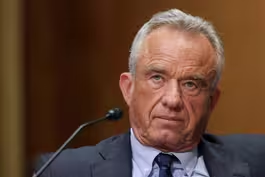
Revised job numbers raise concerns about economic slowdown
Clip: 9/9/2025 | 6m 28sVideo has Closed Captions
Revised job numbers raise new concerns about economic slowdown
The Bureau of Labor Statistics says the U.S. job market is much weaker than initially believed. More than 900,000 fewer jobs were added in 2024 and 2025 than previously reported. The BLS issues revisions every year, but this change is the biggest on record and comes after President Trump fired the BLS commissioner after a weak monthly jobs report. Geoff Bennett discussed more with Julia Coronado.
Problems playing video? | Closed Captioning Feedback
Problems playing video? | Closed Captioning Feedback
Major corporate funding for the PBS News Hour is provided by BDO, BNSF, Consumer Cellular, American Cruise Lines, and Raymond James. Funding for the PBS NewsHour Weekend is provided by...

Revised job numbers raise concerns about economic slowdown
Clip: 9/9/2025 | 6m 28sVideo has Closed Captions
The Bureau of Labor Statistics says the U.S. job market is much weaker than initially believed. More than 900,000 fewer jobs were added in 2024 and 2025 than previously reported. The BLS issues revisions every year, but this change is the biggest on record and comes after President Trump fired the BLS commissioner after a weak monthly jobs report. Geoff Bennett discussed more with Julia Coronado.
Problems playing video? | Closed Captioning Feedback
How to Watch PBS News Hour
PBS News Hour is available to stream on pbs.org and the free PBS App, available on iPhone, Apple TV, Android TV, Android smartphones, Amazon Fire TV, Amazon Fire Tablet, Roku, Samsung Smart TV, and Vizio.
Providing Support for PBS.org
Learn Moreabout PBS online sponsorshipGEOFF BENNETT: Welcome to the "News Hour."
New data showed the U.S. job market was much weaker than initially reported for much of last year during President Biden's term and some of this year under President Trump.
More than 900,000 fewer jobs were added in 2024 and 2025 than previously expected.
The Bureau of Labor Statistics issues these revisions every year, but this year's change is the biggest revision on record.
And it comes after President Trump fired the BLS commissioner last month after a weaker-than-expected monthly jobs report.
For a closer look, we're joined now by Julia Coronado, president of MacroPolicy Perspectives.
It's always great to have you on the program.
So we knew the labor market was softening, but these revisions suggest the slowdown started earlier and was more severe than we thought.
What's your reaction and what factors do you see driving the weakness?
JULIA CORONADO, MacroPolicy Perspectives: So let's keep in mind we get this timely measure of jobs every month from the Bureau of Labor Statistics, and it's based on a sample of firms.
And then there's a quarterly almost a census of employment that comes with a lag.
And we knew a downward revision was coming because we could see some of that quarterly data.
And every year they benchmark this.
So just to kind of -- this is a normal process they go through every year.
We knew that the numbers were a bit overstated.
And one of the challenges right now is that we have had this major swing in immigration from hundreds of thousands of new people entering the labor market every month, every quarter to one where we're actually losing immigrants on balance.
And that I think is part of the -- one contributing factor to the big swing from several hundred jobs being created every month to what now looks like more like 70,000 jobs created every month in the year ending in March.
GEOFF BENNETT: When you say we knew the numbers were overstated, why?
What accounts for that?
JULIA CORONADO: So again, we get this quarterly census of employment.
It's based on the administrative data that underpins the unemployment insurance system that covers pretty much every worker in the country.
So we do want to know on a quarterly basis how many people are working in the economy.
And it's really strong, comprehensive data.
But, again, it's not timely.
And we really want to know in real time, so we have this monthly jobs report.
So we could see as that quarterly data came in that the payroll numbers that we look at every month were a little bit stronger than -- each month than what that quarterly data suggested.
And now we have other measures like ADP private payrolls.
We have got several metrics of independent data.
And then, of course, we have the unemployment rate, which is what tells us whether a lot of people who want to work are not finding jobs.
Excuse me.
And that's not affected by this benchmark revision.
The unemployment rate still is our best measure of weakness.
And what that is telling us right now is that there's a little bit of weakness creeping in, but that even though job creation was a bit smaller over the prior year, unemployment was still pretty low.
GEOFF BENNETT: So what sectors saw the biggest revisions, and what does that tell us about where the economy is losing momentum?
JULIA CORONADO: So most of the downward revisions came in the private sector, and they were concentrated in leisure and hospitality and retail, and then some in wholesale trade as well.
So there were a few sectors where there were some concentrated, very large downward revisions.
Those can be some of the hardest to measure because they feature small -- lots of small firms and a lot of seasonal and part-time employment.
And so those were the areas where we saw the biggest downward revisions.
GEOFF BENNETT: Also today, J.P. Morgan Chase CEO Jamie Dimon said this report confirms that the U.S. economy is slowing.
Take a listen.
JAMIE DIMON, Chairman, J.P. Morgan Chase: I think the economy is weakening.
Whether that is in a -- on the way to recession or just weakening, I don't know.
And that just confirms what we already thought, kind of.
GEOFF BENNETT: Would you agree with that assessment?
JULIA CORONADO: Yes, I think the combination of the data that we're seeing does confirm that the economy is slowing.
I think that is what's going to lead the Fed to lower rates next week, even though inflation is... GEOFF BENNETT: And that was Julia Coronado.
We seem to have -- oh, Julia, you're back with us.
If you can finish your thought there.
We had a technical interruption there.
JULIA CORONADO: OK. Oh, OK, no worries.
I do agree.
The economy is slowing.
We think that the Fed will conclude that when it meets next week and decide to lower interest rates a little bit, even though the challenge it's facing is that we're also seeing higher inflation.
GEOFF BENNETT: On another matter, the White House said that this proves that Biden's economy was a disaster.
They're labeling the Bureau of Labor Statistics as broken.
How much political pressure does that add on this institution, the BLS, that is supposed to be independent?
JULIA CORONADO: There's a lot of pressure on the institution right now.
We -- I certainly see those accusations as completely unfounded.
I have worked with the statisticians at the BLS for decades.
They are dedicated public servants.
There is no evidence of political bias.
They work very hard to maintain high data quality even as their budget gets cut.
So, I don't think that's a fair critique of the agency.
I think the economy, a big, dynamic economy like the U.S. is just really hard to measure.
And if they want some more accurate data, then perhaps we should consider funding the BLS better and allowing them to better meet the challenges of measuring this economy.
GEOFF BENNETT: Julia Coronado, president of MacroPolicy Perspectives, thank you for joining us this evening.
JULIA CORONADO: My pleasure.
Brutal murder in N.C. ignites crime, mental health debate
Video has Closed Captions
Clip: 9/9/2025 | 6m 38s | Brutal murder of Ukrainian refugee in N.C. ignites debate about crime and mental health (6m 38s)
Dan Brown on his new thriller, 'The Secret of Secrets'
Video has Closed Captions
Clip: 9/9/2025 | 8m 28s | Dan Brown on the mysteries and mayhem in his new thriller, 'The Secret of Secrets' (8m 28s)
Israeli strike in Qatar adds volatility to unstable region
Video has Closed Captions
Clip: 9/9/2025 | 11m 39s | Israeli strike on Hamas in Qatar adds fresh volatility to already unstable region (11m 39s)
MAHA report 'not about actions,' food policy expert says
Video has Closed Captions
Clip: 9/9/2025 | 4m 55s | MAHA report 'not about actions,' food policy expert says (4m 55s)
News Wrap: White House faces fallout of Trump's Epstein ties
Video has Closed Captions
Clip: 9/9/2025 | 8m 9s | News Wrap: White House tries to contain fallout of Trump's Epstein ties (8m 9s)
What's in RFK Jr.'s 'MAHA' report – and what's missing
Video has Closed Captions
Clip: 9/9/2025 | 5m 21s | A look at what's in RFK Jr.'s 'Make America Healthy Again' report – and what's missing (5m 21s)
Providing Support for PBS.org
Learn Moreabout PBS online sponsorship
- News and Public Affairs

FRONTLINE is investigative journalism that questions, explains and changes our world.

- News and Public Affairs

Amanpour and Company features conversations with leaders and decision makers.












Support for PBS provided by:
Major corporate funding for the PBS News Hour is provided by BDO, BNSF, Consumer Cellular, American Cruise Lines, and Raymond James. Funding for the PBS NewsHour Weekend is provided by...






